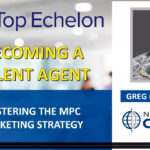It’s always a good time to review your professional agreement letter, the element that connects both client to consultant and service to fee.
Several circumstances arise from time to time that require your firm’s consultants to modify the format of the professional agreement letter. Clients occasionally ask us to sign their version of a fee agreement.
Whenever you decide to deviate from this type of agreement, consider the following five important elements of an effective and fair agreement, which leads to the creation of a great search assignment:
1. Insist on full (30-35%) fees for full service.
Yeah, I know. Many of your clients balk at these rates. My suggestion to those who feel they are limited to acceptance of these low-ball fees is this: the 10%-20% fees (still in existence today) were imposed during eras of slow activity. Many of the HR professionals behind this practice were bound by bad economics at the time. A top-producing desk requires only 10-12 “grade A” searches to maintain high output.
On average, a recruiter needs 30-40 actively engaged client companies to maintain this level of search activity. When you compare the total number of potential clients in your market area or niche to the number you require to flourish, you can see that you ought to say “No!” 95% of the time or more.
This translates into the practical perspective that you can truly afford to say no to many of these low-ballers and better invest your time in identifying the more competitive firms that had the awakening experience that dictates they must use skilled search practitioners who can identify the passive candidates generally out of the reach of other recruiters.
2. Guarantees, if necessary, should be to solve the client’s problem: filling the position.
Promise your best efforts to locate and present a qualified replacement for the candidate who voluntarily leaves your client during initial employment (60 calendar days maximum). Your promise is to present a replacement candidate, not guarantee that they are hired. Do not promise cash refunds and avoid use of such words as “guarantee” or “unconditional guarantee.”
You have no control over the conditions and treatment of the employees your client hires. They DO and should assume responsibility for the outcome of the hire. They will make the choice of whom they hire. The client should assume the responsibility for this decision.
3. Prompt payment of your fee should be required for replacing the candidate.
Consider including this phrase: “Our presentation of a replacement candidate is conditional upon receipt of our fee within ten (10) working days of the initial candidate’s employment.” Your client will place you in the same pile of accounts payables that make payment to commodity suppliers. You are not, or at least should not be, a commodity supplier of search services.
The best argument you possess for prompt payment of your fee is found within the higher level of services and benefit you demonstrate in solving a critical problem on a situational basis for your client. Commodity vendors have imbedded a delay in receivables from companies. Since they continue to supply their customers month after month, they can work with a 60- or 90-day delay in payment for their materials and services.
4. Put it in writing that your fee is computed on total taxable income offered and accepted by your placed candidate.
In the event that a bonus is tough to calculate accurately in advance, give the client one of the following two options: one, calculate that portion of your fee on average bonus projections or the last incumbent’s bonus; or two, invoice at year-end for actual bonus.
Remember the fact that your client will compensate a person based upon what they perceive as a fair and reasonable amount of salary and bonus for the contribution made by your placed candidate. Your fee is based upon a percentage of that total amount.
5. Regardless of how you conclude fee calculations, be sure to document the agreed terms in a fee agreement letter.
— — —
Doug Beabout, CPC, a guest writer for the Top Echelon Recruiter Training Blog, has a career that spans 30 years of expertise in recruiting, personnel services, firm ownership, and training. His tenure in recruiting includes building four highly successful businesses and establishing hundreds for others worldwide. Beabout speaks to state, regional, and private recruiter associations. He is a consultant to many corporations and personnel firms. Beabout is currently owner and president of The Douglas Howard Group, a professional recruiting firm, and conducts several online training programs for recruiters and researchers. He can be reached at 850.424.6933 or via email at trainer@recruiterelearning.com.








